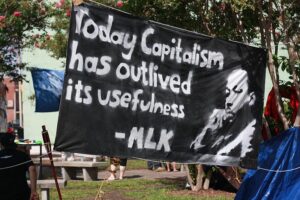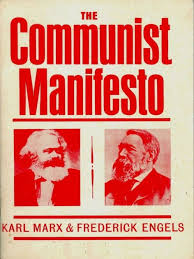
Since 2008 and especially the Covid lockdown the IMF has been dramatically changing course and are now advocating increasing taxes on the wealthy and reducing inequality. Why the change of “heart”?
It is not, of course, concern for the billions of people driven into despair that has energised the likes of the IMF and UBS to call for action against breathtaking inequality. Their worry is that so much wealth has been siphoned off by the rich that the spending power remaining in the hands of the many is too feeble to keep demand up and capitalism in reasonable health. Like a lethal virus that rapidly killed off its host, and thus driving itself into extinction, capitalism is undermining itself by impoverishing and disempowering the “little” people.
At this point anyone still interested in a Marxist analysis of where we are now at should read an article from 2018 by the same author – Yanis Varoufakis: Marx predicted our present crisis – and points the way out. I’ll quote one part of that piece where Varoufakis addresses head-on the typical objections to anything that rhymes with Marxism:
On the topic of dystopia, the sceptical reader will perk up: what of the manifesto’s own complicity in legitimising authoritarian regimes and steeling the spirit of gulag guards? Instead of responding defensively, pointing out that no one blames Adam Smith for the excesses of Wall Street, or the New Testament for the Spanish Inquisition, we can speculate how the authors of the manifesto might have answered this charge. I believe that, with the benefit of hindsight, Marx and Engels would confess to an important error in their analysis: insufficient reflexivity. This is to say that they failed to give sufficient thought, and kept a judicious silence, over the impact their own analysis would have on the world they were analysing.
 The manifesto told a powerful story in uncompromising language, intended to stir readers from their apathy. What Marx and Engels failed to foresee was that powerful, prescriptive texts have a tendency to procure disciples, believers – a priesthood, even – and that this faithful might use the power bestowed upon them by the manifesto to their own advantage. With it, they might abuse other comrades, build their own power base, gain positions of influence, bed impressionable students, take control of the politburo and imprison anyone who resists them.
The manifesto told a powerful story in uncompromising language, intended to stir readers from their apathy. What Marx and Engels failed to foresee was that powerful, prescriptive texts have a tendency to procure disciples, believers – a priesthood, even – and that this faithful might use the power bestowed upon them by the manifesto to their own advantage. With it, they might abuse other comrades, build their own power base, gain positions of influence, bed impressionable students, take control of the politburo and imprison anyone who resists them.
Similarly, Marx and Engels failed to estimate the impact of their writing on capitalism itself. To the extent that the manifesto helped fashion the Soviet Union, its eastern European satellites, Castro’s Cuba, Tito’s Yugoslavia and several social democratic governments in the west, would these developments not cause a chain reaction that would frustrate the manifesto’s predictions and analysis? After the Russian revolution and then the second world war, the fear of communism forced capitalist regimes to embrace pension schemes, national health services, even the idea of making the rich pay for poor and petit bourgeois students to attend purpose-built liberal universities. Meanwhile, rabid hostility to the Soviet Union stirred up paranoia and created a climate of fear that proved particularly fertile for figures such as Joseph Stalin and Pol Pot.
I believe that Marx and Engels would have regretted not anticipating the manifesto’s impact on the communist parties it foreshadowed. They would be kicking themselves that they overlooked the kind of dialectic they loved to analyse: how workers’ states would become increasingly totalitarian in their response to capitalist state aggression, and how, in their response to the fear of communism, these capitalist states would grow increasingly civilised.
Blessed, of course, are the authors whose errors result from the power of their words. Even more blessed are those whose errors are self-correcting. In our present day, the workers’ states inspired by the manifesto are almost gone, and the communist parties disbanded or in disarray. Liberated from competition with regimes inspired by the manifesto, globalised capitalism is behaving as if it is determined to create a world best explained by the manifesto.
I highlighted that last sentence: with the collapse of regimes claiming to represent Marxism the capitalist world has felt at liberty to catapult itself into the direction and extreme inequality that Marx and Engels predicted. Then steam power was the technology that was transforming society; today it is artificial intelligence and automation. Back to the BNE article . . .
Dystopic post-capitalism
Under this dystopic post-capitalism, our techno-feudal lords have the power to manipulate our behaviour at an industrial scale advertisers could never even dream of. Moreover, whereas in years past, extreme poverty hit mostly the unskilled, the rural and the marginalised workers, now it is spreading to white collar professionals, to well-educated people stuck at home or in sectors fast declining, to fading city centres, to artists, musicians and people that used to survive well by doing creative things while doing odd jobs.
If I am right that we are already in the early phase of a spontaneously evolved grim post-capitalism, maybe it is time to start designing, rationally and together, a desirable post-capitalism. But where to begin?
The article Designing a Postcapitalist Future in the Midst of the Pandemic offers some interesting ideas on “where to begin”. (My recent post, No bosses, no wages, no problem began with an explanation that the main text was quoted from a “sci fi” novel but it is actually a serious work that explores alternatives to our current situation. The “sci fi” is merely the “delight” portion of the “teach and delight” method. In the same post I inserted sections from the real company near Seattle on which the ideas are based. So the fiction is “based on a true story”, as they say.)
If you enjoyed this post, please consider donating to Vridar. Thanks!

Very interesting Neil, I have been doing a lot of reading and research over the last couple of years and am convinced that some kind of Modern Monetary Theory maybe our best solution to an increasingly changing world and the challenges that will bring.